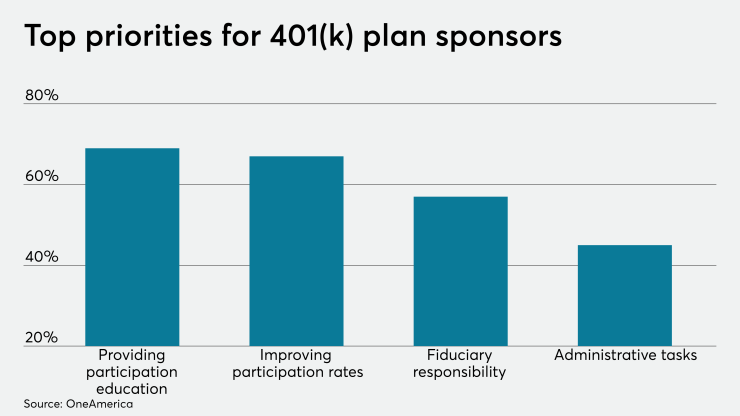Employees have historically been unprepared when it comes to retirement but providing a guaranteed source of income could help them combat their financial stress.
Employers have long recognized the need to help their employees prepare for retirement through workplace savings plans. Despite the economic challenges presented by the pandemic, 74% of employers say helping employees secure their retirement is still a top priority, according to the TIAA Retirement Insights survey.
In-plan guaranteed lifetime income options could be one way to help boost retirement savings and help employees reach their financial goals. A lifetime income annuity is a contract with an insurance company that allows for the conversion of some retirement savings — any amount an employee chooses — into a steady income stream, according to Fidelity.
Read More:
Eighty percent of employees who have guaranteed lifetime income in retirement — like an in-plan annuity — say they feel confident in their progress toward their long-term savings goals, compared to 45% of those who do not have a source of guaranteed lifetime income.
Seventy-one percent of employers polled by TIAA say they believe their employees would be interested in guaranteed lifetime income options, like target date funds with lifetime income allocations. More than half of employees say they would be highly interested in these plan options.
“When people talk about guaranteed income in our industry, they are really talking about pension-type income,” says Tim Walsh, senior managing director at TIAA. “Most employees are thinking ‘How do I replace the monthly paycheck that I’ve been getting throughout my working years, in retirement?’"
Read More:
In a recent one-on-one interview, Walsh shared his thoughts on the survey and how the pandemic has forced employers to reconsider how they help employees secure their retirement.
How has the pandemic changed the attitude around in-plan guaranteed lifetime income options?
Employers are shifting their focus — it’s not just about the savings phase, it's also about making sure their participants have a dignified retirement. Employers have focused on not just the accumulation years, but also the payout years and that’s where guaranteed income comes in.
Read More:
The pandemic has dramatically increased employers' focus on employee physical and financial health. Employers now feel responsible for their employees' overall financial wellness. It's not just about guaranteed income in retirement, it's really about overall employee financial wellness. Employers want their participants to feel secure.
How do 401(k) and 403(b) providers differ when it comes to in-plan guaranteed lifetime income?
403(b)s have always been a core retirement plan, whereas the 401(k) plan was always meant to be supplemental to some type of guaranteed pension income or social security. 403(b) plans always had annuities because they really needed to replace employees’ income with guaranteed income, similar to what a pension plan would do. As employers shift toward focusing on the payout phase, there's an opportunity for 401(k)s to learn from 403(b)s. There’s a lot of talk from 401(k) sponsors about the fact that they want to learn more about guaranteed income. They want to incorporate guaranteed income and they're asking a lot of questions about it.






